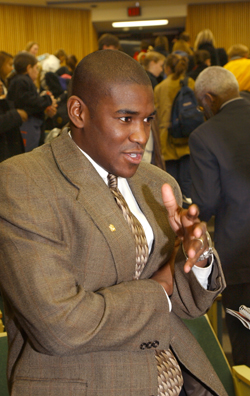
Aranthan Steve Jones II was the featured lecturer at the 2004 Martin Luther King Jr. Commemorative Series. Photo by Anne Rayner
MLK lecturer Jones challenges medicine and nursing students to be hope for future
Aranthan Steve Jones, II, MPH, addressed a near-capacity crowd of students from the Schools of Medicine and Nursing on Wednesday, as part of the 2004 Martin Luther King Jr. Commemorative Series to challenge students to become the hope for the future of health care and the fight to eliminate health disparities and advocate for minority health.
Jones is the Senior Health Legislative Assistant for Donna Christensen, who represents the U.S. Virgin Islands in Congress, and is chair of the Congressional Black Caucus Health Braintrust. In this role, Jones serves as the Health Policy Advisor for the CBC and directs policy positions on access to care and health disparities elimination.
Jones speech, “Somewhere Between Hope and Absurdity: Congress and Minority Health,” focused on the absurdities he’s observed in his work. “The way that we apply policy, particularly in the underserved population, often relegates them to be cast and defined as a problem people,” said Jones.
Jones told the audience that most members of Congress are only focused on three issues when dealing with healthcare: Medicaid and Medicare, prescription drugs, and patients’ rights. “It’s dangerous to view health care in those three ways because it eliminates minorities and the underserved,” he said.
Jones said Congress has also failed when it comes to funding initiatives to assist the nation’s health professions in their training as they prepare to care for the underserved. Jones said Congress would only have to spend about $300 million to fund loan reimbursement programs and other efforts to help the health professions, what he implied was a relatively small amount of money when you consider the billions of dollars given to the Department of Defense.
“Three hundred million dollars, in that context, is a rounding error,” he jokingly stated. Jones said lawmakers allow important health care legislation to pass, like a recent bill to address the nursing shortage, without the funding to support it, but would never dream of passing something like defense related legislation without the funding in place first.
“Even with the best legislation we can pass, it comes down to individual decisions and leadership,” he said. “Ask yourself what you’re doing. We have to have an extraordinary commitment from people like you to solve this problem,” Jones said. He said the “hope” among the “absurdity” in how Congress tackles minority health is the future. “For the first time Congress is actually talking about it on both sides of legislation. They’re introducing a bill dealing with minority health and we hope to get it passed…and funded,” he added. “And we’re energizing individuals like those here today to think about health care and to follow their vision to the hill,” said Jones. “The hope is within. We just have to unleash it.













